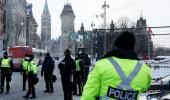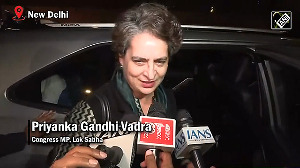The Royal Canadian Mounted Police alleged that the Bishnoi gang is connected to the “agents” of the Indian government, which is targeting the South Asian community specifically "pro-Khalistani elements" in the country.

The remarks were made during a press conference by RCMP Commissioner Mike Duhene and his deputy, Brigitte Gauvin in Ottawa on Monday, hours after India announced the expulsion of six members of the Canadian high commission in Delhi.
On being asked if India is targeting the Sikh community in Canada, Gauvin said, "It is targeting the South Asian community... but they are specifically targeting pro-Khalistani elements in Canada...members of the pro-Khalistan movement.”
“What we have seen, from an RCMP perspective, is that they use organised crime elements," she added.
"It has been publicly attributed and claimed by one organised crime group in particular which is the Bishnoi group here in Canada. We believe the group is connected to agents of the Government of India."
However, investigation agencies in India have linked Lawrence Bishnoi to several crimes in India.
The National Investigation Agency (NIA) has named him in high-profile cases, including smuggling of arms from Pakistan.
The NIA had claimed that Bishnoi was running an extortion syndicate with Canada-based gangster Goldy Brar, who has close links with pro-Khalistan terror outfit Babbar Khalsa International (BKI).
Bishnoi has been allegedly operating his terror-crime Syndicate from jails in India wherever he has been lodged over the years.
WATCH: Canadian Police accuses India of using Lawrence Bishnoi gang to target pro-Khalistani elements
The RCMP's comments came on a day India expelled six Canadian diplomats on Monday and announced that it is withdrawing its High Commissioner in Canada, after dismissing Ottawa's allegations linking the envoy to a probe into the killing of Sikh extremist Hardeep Singh Nijjar.
Canada, however, said it has expelled six Indian diplomats.
India has been strongly rejecting Canada's charge of involvement of Indian agents in Nijjar's killing last year.
The RCMP has been investigating the murder.
The ties between India and Canada came under severe strain following Canadian Prime Minister Justin Trudeau's allegations in September last year of a "potential" involvement of Indian agents in Nijjar's killing.
New Delhi rejected Trudeau's charges as "absurd". India has been maintaining that the main issue has been that of Canada giving space to pro-Khalistani elements operating from Canadian soil with impunity.
At the press conference, Duheme and Gauvin said the announcement was not about the Nijjar case specifically, but rather to inform the public and draw attention to the “breadth of criminal activity that is occurring in Canada, which is a grave concern to our public safety.”
“There's a distinct investigation on the Nijjar case and there's another distinct investigation on the national security side to see the connections with the Government of India,” Duheme was quoted as saying by Toronto's CityNews.
The commissioner read a statement that said the RCMP and other Canadian law enforcement agencies have investigated and charged a “significant number of individuals” for their involvement in homicides, extortions and other criminal violence.
When asked for a specific number, Gauvin said "Approximately eight people were arrested and charged in relation to homicides and 22 people in relation to extortions, with some of them having connections to the Government of India."
The public is being asked to help in reporting incidents of “foreign interference” by the Government of India. Anyone who feels threatened online or in person is encouraged to report the incident to their local police, the report added.
“Indian diplomats and consular officials are here to protect the interests of their nationals that are based in Canada and their country's national interests as well, and not to be part of criminal activity or intimidation or coercion of these individuals. So we take that very seriously. That is without a doubt, a contravention of the Vienna Convention on Diplomatic Relations, but also it goes against Canada's values as a society,” Gauvin said, according to the news portal.










